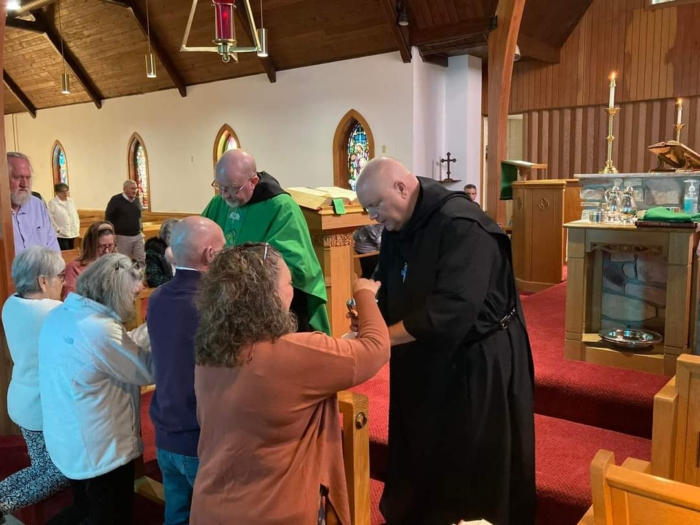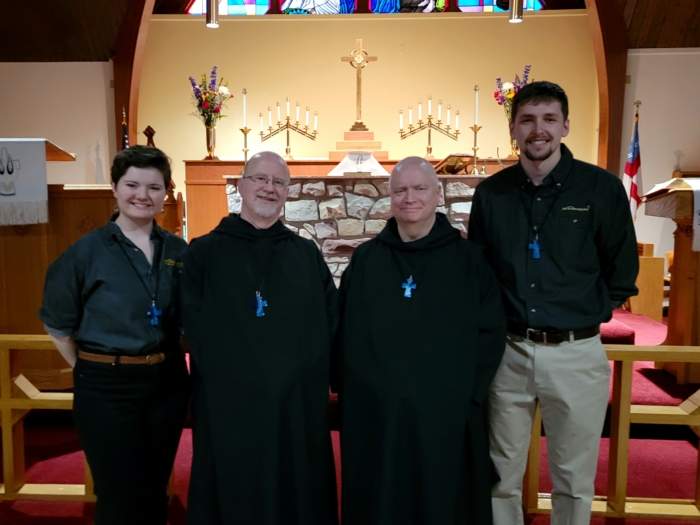Monastic community shares contemplative life with rural Nebraskans in 9-day residencyPosted Feb 6, 2023 |
|

Members of the Benedictine Way distribute Communion at Grace Episcopal Church in Chadron, Nebraska, on Jan. 29, 2023. Photo: The Benedictine Way
[Episcopal News Service] Members of a monastic community in Omaha, Nebraska, have picked up and moved to a small rural town for nine days, bringing their experience of contemplative spirituality to a somewhat isolated and “forgotten” area.
The Benedictine Way has set up shop in Chadron, Nebraska, a town of about 5,200 in the sparsely populated northwest part of the state. Living at Chadron’s Grace Episcopal Church, four members of the community are giving locals the chance to experience the monastic rhythms and ways of life by practicing their daily routines of prayer at the church.
The residency, running from Jan. 28 through Feb. 5, is a way to make monastic life more accessible and bring people together, said Abby Ybay, an oblate – or lay member – of the community.
“I want people to know that a contemplative, service-oriented life is not something reserved for monastics in faraway places, but in fact is a way of life that anyone can choose to follow,” Ybay said.

Four members of the Benedictine Way visited Grace Episcopal Church in Chadron, Nebraska: Abby Ybay, Brother Jerry Thompson, Brother James Dowd and Gage Woodyard. Photo: The Benedictine Way
And it’s also a way of living out the community’s mission of prayer and service to “the poor and forgotten,” said Brother James Dowd, an Anglican Benedictine monk and the prior of the community.
Dowd started the Benedictine Way with help from Nebraska Bishop J. Scott Barker in Omaha in 2018. At the time, “there was nobody anywhere around here who was doing that,” Dowd told Episcopal News Service. Today, the community has two monks and 12 oblates, some of whom live with the monks at the Incarnation Monastery in Omaha.
Originally from New York City, Dowd had an urban perspective on Christian service but developed a deeper understanding of rural America and the problems it faces during his time in Nebraska.
“I have a real commitment, as does the community, that Jesus is found when you go to the margins, when you go to the edge,” Dowd told ENS. “And in my life experience, that has always been inner-city communities that were very poor, where there was a lot of unemployment and a lack of health care and educational opportunities, things like that. So a lot of the work that I’ve done has been in those kinds of environments.
“But as I got to know very rural communities, I started to realize, ‘Wait a minute, the edges are also out here.’ They’re so far removed from churches, from government help.”
Rural regions like the Nebraska Panhandle have suffered from a host of problems in recent decades, such as depopulation, poor health and drug addiction, as industries and small farms have died off.
But there are also less tangible crises going on in these areas, Dowd said.
“While their lives look very, very different from people who live in poor neighborhoods in cities, they’re actually not that different. That feeling of alienation, a feeling of separation from anything they care about – the government, the church, the media, all of it,” he told ENS. “As we deepened our understanding of what life is like in a rural area, we thought, ‘We have to reach out.’ That’s where you meet Jesus on the edge.”
Grace invited members of the community to come for a week, stay in the parish hall, and conduct the daily cycle of five services that they normally do at their monastery, as well as the Sunday Eucharist services. They are also hosting workshops and presentations during their stay, including centering prayer, a vespers service for 12-step programs and a workshop focused on praying with icons.
In addition, they are visiting Chadron State College to tell young adults about their community and the opportunities they offer. College students can apply for a summer internship in which they live at the monastery, working in the community’s gardens and helping with their food pantry. After graduation, they can apply to the Benedictine Service Corps, “a 10-month program in which they explore their spiritual lives and passions, learning about what it means for them to be an adult Christian in the world.” Service corps members are given a placement at a local church or nonprofit based on their skills and interests.
So far, the response from locals has been enthusiastically positive, Dowd said. They were welcomed with “a huge meal,” and people have joined them in the chapel for every Daily Office service except the earliest one at 6 a.m. Fourteen people joined them for vespers on Feb. 1.
“I also think there’s a real hunger,” he told ENS. “My experience with people who grew up or work on farms and ranches is that they actually take to centering prayer more quickly than other people. They spend so much time in silence.”
At the centering prayer workshop, Dowd talked to a ranch foreman who said he spends much of his day alone, working with cattle and repairing fences, and doesn’t carry a radio or any electronics with him.
“And I just listen,” Dowd recalled the rancher saying. “And I wanted to learn more about listening for God.”
– Egan Millard is an assistant editor and reporter for Episcopal News Service. He can be reached at emillard@episcopalchurch.org.

Social Menu